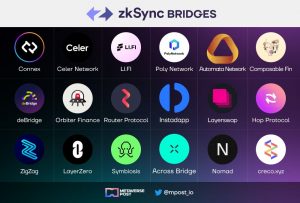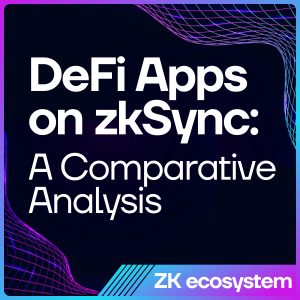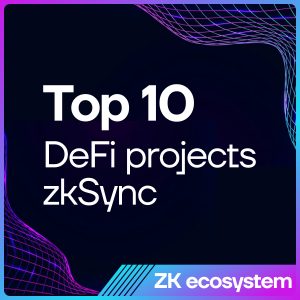ZK-SNARKs vs ZK-STARKs: How Do ZK-Proofs Differ?


In Brief
ZKPs have found extensive use in the world of blockchain, DeFi, and cryptocurrencies, where they help enhance privacy and security.
ZK-SNARKs are a specific type of ZK-proofs that allows a statement to be verified without revealing any information about the statement itself.
ZK-STARKs are a newer type of ZKP that are considered more efficient and secure than ZK-SNARKs.
Zero-knowledge proofs (ZKPs) have become a vital cryptographic technology, providing a way to prove the truth of a statement without revealing any additional information about the statement itself. As such, ZKPs have found extensive use in the world of blockchain, DeFi, and cryptocurrencies, where they help enhance privacy and security.
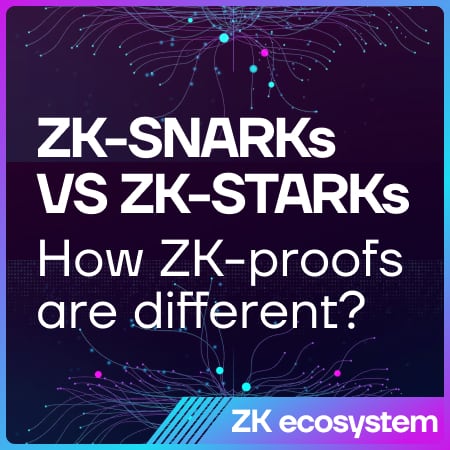
Researchers and users are extensively studying and applying two primary types of ZKPs: ZK-SNARKs and ZK-STARKs.
ZK-SNARKs, or Zero-Knowledge Succinct Non-interactive Argument of Knowledge, are a specific type of ZK-proofs that allows a statement to be verified without revealing any information about the statement itself. ZK-SNARKs have been used by projects like Zcash and JP Morgan Chase’s blockchain-based payment system. They’ve also been used as a tool for securely authenticating clients to servers. The significant advantages of ZK-SNARKs include their small proof size and low verification costs. However, they require a trusted setup, and the computational complexity of the prover is high.
Zero-Knowledge Scalable Transparent Arguments of Knowledge, also known as ZK-STARKs, represent a more efficient and secure type of ZKP than ZK-SNARKs. People consider these a newer development. ZK-STARKs do not require a trusted setup, which is a significant advantage over their predecessors. Additionally, they are resistant to quantum attacks and have a much faster verification time. However, they have larger proof sizes than ZK-SNARKs, which can be a limitation.
Comparative ZK-proofs Table
| Feature | ZK-SNARKs | ZK-STARKs |
|---|---|---|
| Trusted Setup | Required | Not Required |
| Proof Size | Small | Larger |
| Verification Speed | Slower | Faster |
| Scalability | Limited | High |
| Transparency | Lower (due to trusted setup) | High |
| Security | High, but can be compromised if setup is breached | High |
| Computational Requirements | Intensive, requires a lot of computational resources | Intensive, but more efficient |
| Use Cases | Zcash, JP Morgan Chase’s blockchain-based payment system, etc. | Cross-chain privacy layers, interoperability across different blockchain networks, etc. |
| Vulnerability | Vulnerable to breaches if initial parameters of the trusted setup are compromised | No trusted setup, hence less vulnerable to breaches |
ZK-SNARKs

ZK-SNARKs are a specific form of zero-knowledge proofs that have become increasingly significant in blockchain technology and cryptocurrency. A ZK-SNARK allows one party (the prover) to prove to another party (the verifier) that they know a value x without providing any information apart from the fact that they know the value x. This is particularly useful in maintaining privacy and security in digital transactions.
Within the realm of blockchain and cryptocurrency, people use ZK-SNARKs to confirm transactions while keeping sensitive details hidden. Take the privacy-centered cryptocurrency Zcash, for instance, which uses ZK-SNARKs to make transactions confidential. This method obscures sender and recipient addresses, along with transaction amounts, from the public blockchain, thereby enhancing privacy for users. JP Morgan Chase’s blockchain-based payment system has also opted for ZK-SNARKs for secure client-server authentication.
One of the main advantages of ZK-SNARKs is their succinctness, meaning the proof they generate is small and can be verified quickly, which is crucial for scalability in blockchain networks. However, a significant limitation of ZK-SNARKs is that they require a “trusted setup,” a securely generated set of cryptographic parameters. If the trusted setup is compromised, it could allow for the creation of forged proofs.
In recent years, developers and researchers have been exploring ways to overcome the limitations of ZK-SNARKs and expand their use cases. Developers have created zero-knowledge roll-ups, solutions that enhance the scalability of Ethereum and other blockchain networks, using ZK-SNARKs as a foundation.
ZK-STARKs

ZK-STARKs represent a newer form of zero-knowledge proofs that offers certain advantages over ZK-SNARKs.
While ZK-SNARKs and ZK-STARKs both enable a prover to demonstrate the truth of a statement without revealing any additional information, ZK-STARKs offer improvements in terms of scalability and transparency.
One of the main advantages of ZK-STARKs is that, unlike ZK-SNARKs, they don’t require a trusted setup. ZK-SNARKs require a trusted setup, which can result in false proofs if someone compromises the initial parameters. ZK-STARKs, by not needing such a setup, offer higher security and transparency, thereby considered safer.
ZK-STARKs are also faster to verify and can handle larger computations, which makes them highly scalable. This property is particularly beneficial for blockchains and other distributed systems where efficiency and scalability are key concerns.
However, ZK-STARKs are not without their drawbacks. For one, the proof sizes are larger than those of ZK-SNARKs, which can lead to increased storage and bandwidth requirements. Despite this, the increased security, transparency, and scalability of ZK-STARKs make them an important development in the field of zero-knowledge proofs and a promising technology for the future of blockchain and cryptocurrency.
Extensive research and utilization of both ZK-SNARKs and ZK-STARKs are prevalent in the field of cryptography and blockchain.For instance, the zkSync 2.0 upgrade aims to bring ZK-SNARKs to Ethereum to provide scalability and lower fees, contributing significantly to DeFi on Ethereum.
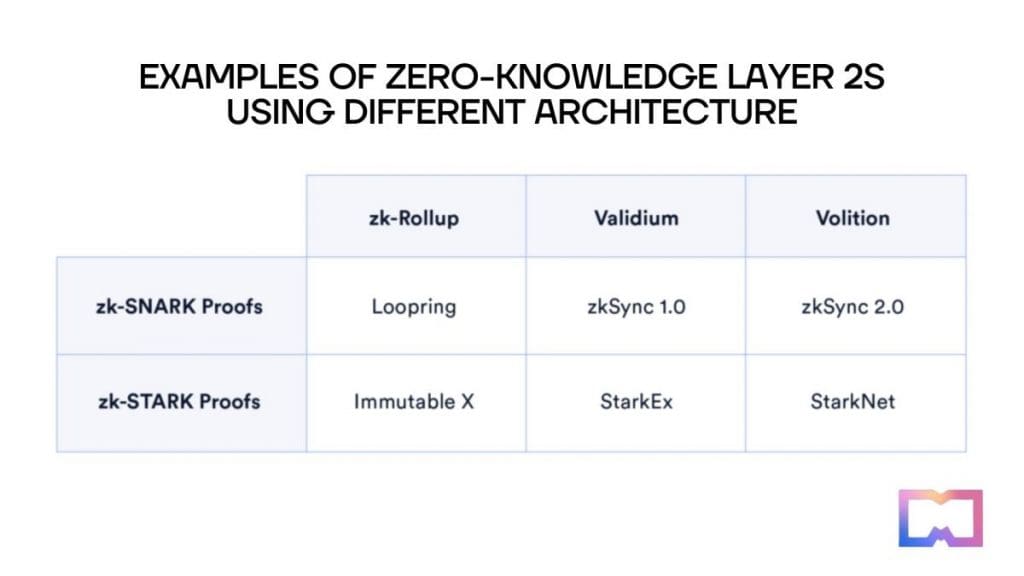
Conclusion
The emergence of ZK-proofs, such as ZK-SNARKs and ZK-STARKs, signifies a promising leap forward in the realm of cryptographic systems, particularly when it comes to privacy and security. Each type of ZK-proofs carries its own strengths and weaknesses, with ZK-SNARKs having smaller proof sizes and widespread adoption yet requiring a trusted setup. On the other hand, ZK-STARKs offer increased transparency and scalability and eliminate the need for a trusted setup, making them less susceptible to breaches.
However, it’s important to note that both ZK-SNARKs and ZK-STARKs require intensive computational resources, which could be a limiting factor in their broader application. Looking ahead, the evolution of these technologies will likely continue to address these challenges and further expand their applicability, driving innovation and advancement in the field of blockchain technology and beyond. The choice between ZK-SNARKs and ZK-STARKs will largely depend on the specific requirements of a given use case, such as the need for scalability, speed, or transparency.
Read more:
- A Beginner’s Guide to the zkSync Ecosystem
- ZK-Proofs: What Is Zero Knowledge?
- History of Zero-Knowledge Proofs: From Cryptography to Blockchain
Disclaimer
In line with the Trust Project guidelines, please note that the information provided on this page is not intended to be and should not be interpreted as legal, tax, investment, financial, or any other form of advice. It is important to only invest what you can afford to lose and to seek independent financial advice if you have any doubts. For further information, we suggest referring to the terms and conditions as well as the help and support pages provided by the issuer or advertiser. MetaversePost is committed to accurate, unbiased reporting, but market conditions are subject to change without notice.
About The Author
Nik is an accomplished analyst and writer at Metaverse Post, specializing in delivering cutting-edge insights into the fast-paced world of technology, with a particular emphasis on AI/ML, XR, VR, on-chain analytics, and blockchain development. His articles engage and inform a diverse audience, helping them stay ahead of the technological curve. Possessing a Master's degree in Economics and Management, Nik has a solid grasp of the nuances of the business world and its intersection with emergent technologies.
More articles

Nik is an accomplished analyst and writer at Metaverse Post, specializing in delivering cutting-edge insights into the fast-paced world of technology, with a particular emphasis on AI/ML, XR, VR, on-chain analytics, and blockchain development. His articles engage and inform a diverse audience, helping them stay ahead of the technological curve. Possessing a Master's degree in Economics and Management, Nik has a solid grasp of the nuances of the business world and its intersection with emergent technologies.




















































